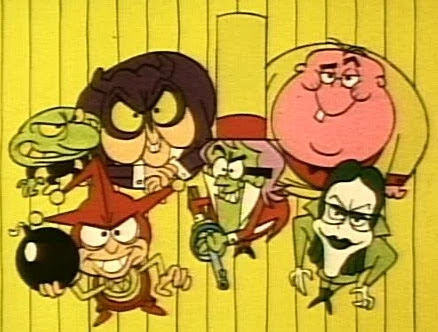I come today to defend Bob Kane's greatest creation.
Now, there are some (okay...many) who charge that Bob Kane has no "creations"; that all his work was cribbed off of (or stolen from) others. It is certainly true that originality was not Kane's forte; I have no intention of dismissing the long-documented facts about how much of the work he was known for deserves to be credited to others (either "instead" or "as well").
 |
| No need to take any obvious swipes at Kane. |
I do want to point out, however, that although Kane was not the most original creator, his real strength was as an aggregator, someone who takes disparate existing elements and arranges them in ways that seem at the same time both new and yet familiar. For example, The Batman (a character commonly associated with Kane) isn't really what we think of him as: the first non-super costumed crimefighter. He is the evolved result of scores of previous pulp heroes, such as The Shadow and Zorro. Batman is like Bach; he is not the first of his kind, he is the PINNACLE of his kind, the culmination of the style he embodies. Kane deserves at least some credit for contribution to that synthesis of ideas.
There's an episode of an old science fiction show, "Star Trek: The Next Generation", in which a human praises the originality of an android's interpretation of a violin piece. The android corrects him, saying he was really just combining the interpretative styles of several famous violinist. Significantly, the human corrects him back, pointing out the choices involved in doing that constitute a type of individuality in themselves. "YOU chose the violinists, [who] have radically different styles, different techniques, and yet... you combined them, successfully." It may not be QUITE the same as 'total originality', but perhaps the android was simply more conscious of the influences upon his style than a human would.
If Bob Kane had a forte, it was a gift for synthesis and the creative re-use of existing templates.
 |
| Or, sometimes, not so creative. |
It is with that in mind that I must defend Bob Kane's Greatest Creation:
 |
| "Danger is his business." |
I tired of repeatedly seeing the "conventional wisdom" that Cool McCool was a Terrible Cartoon, parroted, I suspect, mostly by people who have never even seen the show.
Like Batman, Cool McCool was a Kane-style synthesis of a number of archetypal elements. He was a James Bond style secret agent with gadgets, but a clumsy fool-with-catchphrases (such as Maxwell Smart). He had the dry wit (and voice) of Jack Benny and a tendency toward malapropisms. He has a semi-sentient car (The Coolmobile, of course), which acts like a faithful horse, in Zorro tradition. His episodes regularly feature his father and uncles as ersatz Keystone Kops.
 |
| Tom, Dick, and Harry McCool |
But like a superhero, he has a regular rogues' gallery, featured prominently in the show (and the shows' bumpers), all pretty clearly inspired by Batman's foes (I leave it to you to figure out which):
 |
| The Rattler, Jack-in-the-Box, The Owl, Dr. Madcap, Hurricane Harry, and Greta Ghoul will seem vaguely familiar, I'm sure, even if you've never seen the show. |
 |
| "Now Number One thinks me the fool; has not respect for the name McCool. But in the days gone by, right up at the top, there was Harry McCool. He was my Pop! My Pop, the cop!" |

4 comments:
I'm unfamiliar with Cool McCool, which honestly surprises me. I've got a pretty extensive knowledge (and DVD collection) of cartoons from the 60s and somehow I missed this one. And is it just me, or does Cool rather look like Bob Kane?
Ok, you've sold me on CmC. Now how was Batman not the Shadow but worse?
I don't think there was much there 'till Robin.
Hm. Pretty sure that's just you, Brian!
The Shadow wasn't designed for kids, he was designed as a radio character for adults. He technically wears just an "outfit" rather than a costume, for one. He was also simply TOO mysterious (and murderous) to easily identify with. These may seem like minor points, but part of the point of the post is that such minor details add up. But, YES, the Sensational Character Find of 1940 is definitely what put Batman over the top.
Post a Comment